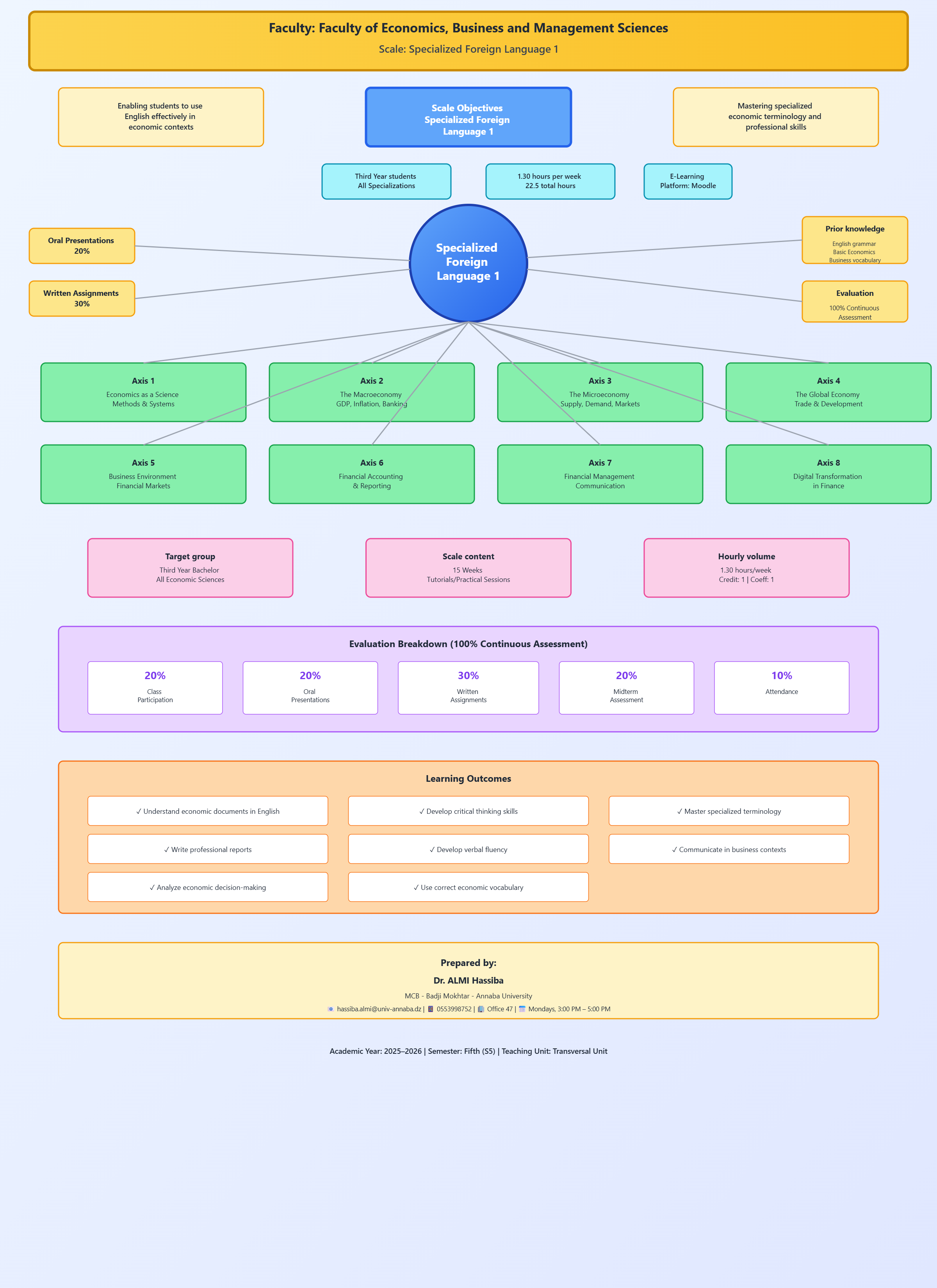Aperçu des sections
Généralités
Welcome to Specialized Foreign Language 1! 🎓
Dear Students,
Welcome to the Specialized Foreign Language 1 module for Third-Year Bachelor's students specializing in Digital Economics and Data Analysis for the academic year 2025/2026.

🌟 Welcome to Your Professional English Journey!
You are about to embark on an exciting learning experience that will open doors to the global economy and international business opportunities. In today's digital world, English proficiency in economics and finance is not just an asset—it's essential for your career success.
🎯 What Will You Learn?
Throughout this semester, you will develop:
✨ Advanced economic and financial vocabulary in English
✨ Skills to analyze economic texts and business documents
✨ Professional writing abilities for reports and correspondence
✨ Oral communication skills for business presentations
✨ Understanding of macroeconomics, microeconomics, and global markets
✨ Knowledge of digital transformation in financial services📚 How Will We Learn?
This module combines in-person learning and online resources:
🔹 Weekly lectures: Mondays, 3:00 PM – 5:00 PM
🔹 Interactive tutorials: Practical exercises and discussions
🔹 Oral presentations: On current economic topics
🔹 Written assignments: Reports and business documents
🔹 E-learning platform: Resources, forums, and activities
🔹 Continuous assessment: Regular feedback on your progress📊 Assessment Breakdown:
- Class Participation: 20%
- Oral Presentations: 20%
- Written Assignments: 30%
- Midterm Assessment: 20%
- Attendance & Engagement: 10%
Note: This module is 100% continuous assessment (no final exam).
💪 I'm Here to Support You!
Don't hesitate to reach out if you have questions or need guidance:
📧 Email: hassibali090@gmail.com
💬 Platform Messages: Preferred communication method
🕐 Office Hours: Mondays, 3:00 PM – 5:00 PM
📍 Office: Room 47, Department of Economic Sciences🚀 Get Started Now!
To begin successfully:
✅ Explore the e-learning platform and familiarize yourself with the course sections
✅ Download and read the complete syllabus
✅ Review the weekly schedule and course content
✅ Attend the first lecture: Monday, October 6, 2025 at 3:00 PM
✅ Introduce yourself in the discussion forum💡 Tips for Success:
- Read English economic articles daily (even 10-15 minutes helps!)
- Listen to business news or economic podcasts in English
- Practice writing summaries of economic texts
- Participate actively in class—don't fear making mistakes!
- Use specialized economic dictionaries and glossaries
- Collaborate with your classmates on assignments
🌈 Let's Achieve Excellence Together!
I believe in your ability to succeed and excel. This module will equip you with essential language skills for your future career in digital economics and international business. Your success depends on your commitment and active participation.
Let's make this semester a rewarding learning experience!
Welcome, and best wishes for your success! 🎓✨
Dr. Hassiba Almi
Assistant Professor (Grade B)
Module Coordinator - Specialized Foreign Language 1📍 Badji Mokhtar University - Annaba
🏫 Faculty of Economic Sciences, Commercial Sciences, and Management Sciences
📅 Academic Year 2025/2026🔗 Important Links:
📌 E-learning Platform: https://elearning-facsceg.univ-annaba.dz/course/view.php?id=710
📧 Email: hassibali090@gmail.com
📅 First Lecture: Monday, October 6, 2025 at 3:00 PM#SpecializedEnglish #DigitalEconomics #DataAnalysis #Bachelor #UnivAnnaba
Identification of the Teaching Subject
University: Badji Mokhtar - Annaba University
Faculty: Economic Sciences, Commercial Sciences, and Management Sciences
Department: Economic Sciences
Level: Third-Year Bachelor's Degree (Licence)
Specialty: Digital Economics and Data Analysis
Semester: Fifth
Academic Year: 2025/2026Module Name: Specialized Foreign Language 1
Teaching Unit: Horizontal
Credits: 1
Coefficient: 1
Weekly Lecture Hours: 1.5 hours
Total Semester Hours: 22.5 hours-
Instructor: Dr. Almi Hassiba, Assistant Professor "MCB"
-
Office Location: Office 47, Department of Economic Sciences
-
Email: hassibali090@gmail.com
-
Course Time: Mondays, 3:00 PM – 5:00 PM
- Contact Email: hassibali090@gmail.com
- E-Learning Platform: https://elearning-facsceg.univ-annaba.dz/course/view.php?id=710
-
Declaration and Syllabus

📄 Syllabus
This syllabus outlines the Specialized Foreign Language 1 module for Third-Year Bachelor's (L3) students specializing in Economics and Business Management at Badji Mokhtar - Annaba University.
Delivered through e-learning resources via Moodle with 100% continuous assessment, the course builds practical English language proficiency in economic and business management contexts, develops professional communication skills (oral presentations, report writing, business correspondence, business plans), and enhances understanding of macroeconomic, microeconomic, management, organizational, marketing, and entrepreneurial concepts through specialized English terminology and authentic materials.
The module prepares students for careers in corporate management, human resources, marketing, entrepreneurship, and economic analysis by developing essential language competencies for professional success in both national and international business environments.
📌 Important Notice to Students
📌 Action Required
Dear Student,
Thank you for reviewing the Specialized Foreign Language 1 Module Syllabus. This document is your roadmap to success this semester!
✅ Next Steps:
1. Read the Syllabus Carefully Review all sections to understand the module objectives, assessment criteria, weekly schedule, and academic policies.
2. Sign the Acknowledgment Form After reading the syllabus, please sign the acknowledgment form available with your class representative. Your signature confirms that you:
✅ Have read and understood the syllabus
✅ Agree to the assessment methods and deadlines
✅ Commit to active participation and academic integrity
✅ Will attend lectures regularly and complete assignments on time
✅ Understand the continuous assessment policy (no final exam)⚠️ Important: Signing the form is mandatory and will be considered in your Attendance and Active Participation grade (10%).
📅 Deadline: October 15, 2025
Questions? Contact me via the e-learning platform or email: hassibali090@gmail.com
Dr. Hassiba Almi
Module Instructor"Your signature is the first step toward mastering English for Economics and Business!" 🎓

Declaration form concerning the commitment to adhere to ethical standards and professional conduct for remote learning.

📜 Instructor's Ethics Declaration for Teaching
This document contains the instructor's signed commitment to:
✓ Respect ethical rules and professional standards in education
✓ Comply with anti-plagiarism regulations (Ministerial Decree No. 933 of July 28, 2016)
✓ Ensure authenticity and quality of all educational materials
✓ Provide quality education using best pedagogical practices
✓ Support student learning through clear communication and fair assessment
✓ Maintain professional conduct in all interactions with studentsSigned: Dr. Hassiba Almi
Date: October 5, 2025
Position: Assistant Professor (Grade B)
Module: Specialized Foreign Language 1🗣️ Welcome to the Discussion Forum – Specialized Foreign Language 1
Dear Students,
Welcome to the official forum of our Specialized Foreign Language 1 module (Semester 5 – L3, Digital Economics and Data Analysis).
This space is designed to foster collaborative learning, discussion, and practice of English in economic and business contexts. Here, you can:
✅ Ask questions related to lectures, vocabulary, grammar, and weekly topics
✅ Share your ideas and reflections on economic concepts in English
✅ Practice your English writing skills in a supportive environment
✅ Engage in peer-to-peer learning and help each other improve
✅ Discuss assignments, presentations, and written reports
✅ Share interesting economic articles, videos, podcasts, or resources in English
✅ Receive announcements, feedback, and guidance from your instructor
📌 Forum Guidelines
✔️ Be respectful and supportive – we're all here to learn and improve together
✔️ Write in English – this is your practice space! Don't worry about mistakes; they're part of learning
✔️ Title your posts clearly (e.g., "Question about GDP terminology" or "Help with Week 3 presentation")
✔️ Search before posting – someone may have already asked your question
✔️ Keep messages relevant to course material and English language learning
✔️ Respond to peers – help create a collaborative learning community
✔️ Use economic terminology – practice using the specialized vocabulary we learn in class
✔️ Proofread before posting – it's good practice for professional communication💬 Introductory Discussion – Let's Get Started!
Week 1 Question:
"Introduce yourself and share: What do you hope to achieve by improving your English skills in economics and business? How do you think English proficiency will benefit your future career in digital economics?"

Reply to this thread with a short paragraph (5-7 sentences). This is your first writing practice – express yourself freely and don't worry about perfection!
Example structure:
- Your name and background
- Your career aspirations
- Why English matters in your field
- One specific goal for this course
💡 Weekly Discussion Topics
Each week, I will post a discussion question related to our lecture topics. Participating in these discussions will contribute to your Class Participation grade (20%).
Stay active, engaged, and curious!
Looking forward to a semester full of learning, growth, and confident English communication in the world of economics!
Warm regards,
Dr. Hassiba Almi
📧 hassibali090@gmail.com
📌 E-learning Platform: https://elearning-facsceg.univ-annaba.dz/course/view.php?id=710
🕐 Office Hours: Mondays, 3:00 PM – 5:00 PM"Every post you write is a step toward professional English fluency!" 🎓✨
📅 Important Announcement for Specialized Foreign Language 1 Students
Dear Students,
Weekly interactive sessions will be held via BigBlueButton (BBB) following the scheduled class time.
📆 Schedule
Day & Time: Every Monday, 15:00–17:00
Primary Platform: BigBlueButton (BBB)
- Link posted weekly in the E-learning section ("Live Session")
Backup Platform: Google Meet (only if BBB experiences technical issues)
- Permanent Link: https://meet.google.com/yzm-uqcp-mxc
- This link will be used if BBB is unavailable during the scheduled session
💬 Google Meet for Additional Discussion Sessions
The Google Meet link is also available for:
- Post-class discussion sessions (after the main lecture)
- Q&A sessions by appointment
- Individual consultations and feedback on assignments
- Presentation rehearsals (optional practice sessions)
- Emergency backup if BBB is down
Permanent Google Meet Room: https://meet.google.com/yzm-uqcp-mxc
✨ What to Expect in Live Sessions
🔹 Interactive lectures on economic topics in English
🔹 Vocabulary building and terminology practice
🔹 Reading and analyzing authentic economic texts
🔹 Group discussions and debates on current economic issues
🔹 Oral presentation practice and peer feedback
🔹 Writing tips for reports and business correspondence
🔹 Q&A and clarifications on assignments
🔹 Real-world case studies from international business
📋 Session Guidelines
✅ Join on time (15:00 sharp)
✅ Test your audio/video beforehand
✅ Keep mic muted unless speaking
✅ Use chat for questions during presentations
✅ Camera on when possible to enhance engagement
✅ Review weekly materials on Moodle before the session
✅ Participate actively — counts toward your Participation grade (20%)
✅ Come prepared with questions and topics to discuss⚠️ Attendance Policy
- Minimum 75% attendance required (≥ 11 of 15 sessions)
- Attendance is tracked automatically via BBB/Google Meet
- Sessions are recorded; access granted to students with valid absences
- If you miss a session, watch the recording within 48 hours
- Attendance and participation count toward 10% of your final grade
🗓️ First Session
Date: Monday, October 6, 2025
Time: 15:00–17:00
Topic: Course Introduction – Economics as a Science & Economic Methods
Link: BBB room (see Moodle "Week 1 → Live Session")If BBB fails, join immediately via Google Meet: https://meet.google.com/yzm-uqcp-mxc
What to prepare:
- Review the syllabus on Moodle
- Test your internet connection and BBB/Google Meet access
- Prepare a brief self-introduction in English (name, background, goals)
- Have notebook/dictionary ready
📌 Important Notes
- Always check Moodle first for the BBB link
- Google Meet is backup only during scheduled sessions
- For post-class discussions, feel free to use the Google Meet link anytime
- Technical issues? Contact support immediately and join via Google Meet
- All course materials, recordings, and assignments are posted on Moodle
- Active participation in live sessions is essential for your success
📧 How to Contact Me
✉️ Email: hassibali090@gmail.com (preferred method)
💬 Moodle Messages: Via the e-learning platform
💻 Google Meet (Office Hours): https://meet.google.com/yzm-uqcp-mxc
🕐 Office Hours: Mondays, 15:00–17:00 or by appointment💻 Essential Links
🔗 Moodle Course: https://elearning-facsceg.univ-annaba.dz/course/view.php?id=710
🔗 Google Meet Room (Backup & Consultations): https://meet.google.com/yzm-uqcp-mxc📊 Assessment Reminder
This module is 100% continuous assessment (no final exam):
- Class Participation & Engagement: 20%
- Oral Presentations: 20%
- Written Assignments (Reports/Essays): 30%
- Midterm Assessment: 20%
- Attendance & Active Participation: 10%
We look forward to your active participation!
Dr. Hassiba Almi
📧 hassibali090@gmail.com
Assistant Professor (Grade B)
Module Coordinator – Specialized Foreign Language 1Platform Priority: BBB (primary) → Google Meet (backup & discussions)
Learning Objectives
General Objective of this Module:
This course enables students to use English effectively in economic and business contexts, enhancing their academic formation and expanding their knowledge base in monetary and financial economics through specialized foreign language competencies.

Upon successful completion of this course, students should be able to:
1. Remembering (Knowledge)
- Recall and define specialized economic and financial terminology in English
- Identify key concepts in macroeconomics, microeconomics, and international trade
- Recognize different economic systems, market structures, and financial institutions
- List the components of GDP, types of inflation, and monetary policy tools
2. Understanding (Comprehension)
- Explain fundamental economic concepts such as supply and demand, fiscal policy, and international trade
- Summarize academic articles and business documents related to monetary and financial economics
- Describe the role of banking systems, money, and digital transformation in financial services
- Interpret economic indicators, business cycles, and market trends
3. Applying (Application)
- Use specialized economic vocabulary accurately in written and oral communication
- Apply economic concepts to analyze real-world business situations and case studies
- Write professional reports, business correspondence, and academic essays on economic topics
- Demonstrate appropriate use of English in economic presentations and discussions
4. Analyzing (Analysis)
- Analyze documents related to monetary and financial economics in English
- Compare different economic systems, market structures, and policy approaches
- Examine the relationships between economic variables (inflation, unemployment, GDP)
- Distinguish between macroeconomic and microeconomic issues in authentic texts
5. Evaluating (Evaluation)
- Develop critical thinking skills related to economic analysis and decision-making
- Assess the impact of fiscal and monetary policies on economic performance
- Evaluate business strategies and economic development approaches
- Critique economic arguments presented in academic and professional texts
6. Creating (Synthesis)
- Produce well-structured reports and correspondence related to economic and financial matters in English
- Develop oral presentations on economic topics with clear arguments and supporting evidence
- Design professional business documents for international economic contexts
- Formulate informed opinions on current economic issues using specialized terminology
Course Units
Welcome to Specialized Foreign Language 1!
This comprehensive module is designed to guide you through the essential English language skills needed for success in economics and business. From foundational economic concepts to professional communication, each unit is structured to provide clear, practical learning and build your language proficiency progressively, with a specific focus on academic and professional contexts.

Axis 1: Economics as a Science
This foundational unit introduces economics and its methodologies in English.
1.1 Economics and Economic Methods
- Defining economics: scarcity, choice, and resource allocation
- Understanding economic thinking and problem-solving approaches
- Learning key terminology: economics, microeconomics, macroeconomics
- The scientific method in economic analysis
1.2 Economic Systems
- Types of economic systems: market, command, mixed economies
- Comparing capitalism, socialism, and mixed systems
- Understanding economic efficiency and equity
- Vocabulary for describing economic structures
Axis 2: The Macroeconomy
This unit focuses on macroeconomic concepts and their English terminology.
2.1 Gross Domestic Product (GDP)
- Defining and measuring GDP
- Components of GDP: consumption, investment, government spending, net exports
- Real vs. nominal GDP
- Economic growth and development indicators
2.2 Inflation
- Understanding inflation and deflation
- Measuring inflation: CPI and other indices
- Causes and consequences of inflation
- Monetary stability terminology
2.3 Economic Business Cycles and Unemployment
- Phases of business cycles: expansion, peak, recession, trough
- Types of unemployment: frictional, structural, cyclical
- Analyzing employment data and labor market trends
- Understanding economic fluctuations
2.4 Banking
- The role of banks in the economy
- Commercial banks vs. central banks
- Banking operations and financial intermediation
- Financial system vocabulary
2.5 Money and Monetary Policy
- Functions of money: medium of exchange, store of value, unit of account
- Central banking and monetary policy tools
- Interest rates and their economic impact
- Understanding monetary transmission mechanisms
2.6 Fiscal Policy
- Government spending and taxation
- Budget deficits and surpluses
- Fiscal policy tools and their effects
- Public finance terminology
Axis 3: The Microeconomy
This unit explores microeconomic principles in English.
3.1 Supply and Demand
- The law of supply and demand
- Market equilibrium and price determination
- Elasticity concepts: price, income, cross-price
- Consumer and producer behavior
3.2 Market Structure
- Perfect competition, monopoly, oligopoly, monopolistic competition
- Market power and efficiency
- Competition policy and regulation
- Industry analysis vocabulary
Axis 4: The Global Economy
This unit examines international economics and trade.
4.1 International Trade
- Theories of international trade: absolute and comparative advantage
- Trade policies: tariffs, quotas, trade agreements
- Balance of payments and exchange rates
- Globalization and its impacts
4.2 Global Market and Developing Nations
- Economic development and growth strategies
- Challenges facing developing economies
- International organizations: WTO, IMF, World Bank
- Global economic integration
Axis 5: Business Environment and Financial Markets
This unit covers business contexts and financial systems.
- Business organizations and corporate structures
- Financial markets: stocks, bonds, derivatives
- Risk and return in investment
- Corporate governance and business ethics
- Reading financial news and reports in English
Axis 6: Principles of Financial Accounting and Reporting
This unit introduces accounting concepts in English.
- Basic accounting principles and terminology
- Financial statements: balance sheet, income statement, cash flow
- Understanding financial ratios and analysis
- Reading and interpreting financial reports
Axis 7: Financial Management and Professional Communication
This unit develops professional communication skills.
- Financial decision-making and capital budgeting
- Investment analysis and project evaluation
- Writing professional emails and business letters
- Report writing for economic and financial contexts
- Business meeting vocabulary and etiquette
Axis 8: Digital Transformation in Finance
This unit explores technology's impact on finance and economics.
8.1 Information and Communication Technology
- Digital economy fundamentals
- E-commerce and digital business models
- Technology terminology in economics
- Data-driven decision making
8.2 Digital Management in Financial Services
- Fintech innovations: digital banking, mobile payments
- Blockchain and cryptocurrencies
- AI and automation in finance
- Digital transformation vocabulary
Assessment and Practice
Throughout these units, you will engage in:
✅ Weekly readings on economic topics in English
✅ Vocabulary exercises to build specialized terminology
✅ Written assignments: reports, essays, business correspondence
✅ Oral presentations on economic and business topics
✅ Midterm assessment covering Units 1-4
✅ Discussion forums for collaborative learning and practice
✅ Final presentation demonstrating mastery of economic English
Learning Path
Each unit builds upon the previous ones, creating a comprehensive learning experience:
Weeks 1-2: Foundation (Axis 1: Economics as a Science)
Weeks 3-8: Macroeconomic Concepts (Axis 2)
Weeks 9-10: Microeconomic Principles (Axis 3)
Weeks 11-12: Global Economics (Axis 4)
Weeks 13-15: Applied Topics (Axes 5-8: Business, Finance, Digital Economy)Navigate through the units progressively, practice actively, and don't hesitate to ask questions in the forum or during live sessions!
Dr. Hassiba Almi
📧 hassibali090@gmail.comStudents must have successfully completed the lessons of Semesters 1, 2, 3 and 4. They should have developed a strong understanding of basic concepts related to their fields of expertise, namely:
Economics
- Basic microeconomics and macroeconomics concepts
- Understanding of economic systems and markets
- Fundamental economic terminology
English Language
- Basic English grammar and sentence structure
- Elementary reading and writing skills
- Foundation vocabulary (general and academic)
Business and Management
- Basic business concepts and terminology
- Understanding of business environments
- Fundamental knowledge of financial concepts
Research and Study Skills
- Basic academic reading strategies
- Note-taking and summarizing skills
- Elementary research and information literacy
Additionally, students should possess basic English language proficiency from their previous semesters and willingness to practice speaking and writing in English.
Specific Prerequisites for Specialized Foreign Language 1:
To succeed in this module, students should ideally have:
✅ Basic English Grammar (present, past, future tenses; basic sentence structures)
✅ General Vocabulary (ability to understand simple texts and communicate basic ideas)
✅ Reading Skills (ability to read and understand simple English texts)
✅ Writing Skills (ability to write simple sentences and short paragraphs)
✅ Listening Comprehension (basic understanding of spoken English)
✅ Motivation to Learn and willingness to practice English regularly
✅ Computer Literacy (ability to use Moodle, Google Meet, and basic digital tools)
✅ Basic Economics Knowledge from Semesters 1-3 (in Arabic or French)
📝 Prerequisite Quiz
Before starting this quiz, please make sure you have completed your Semesters 1, 2, and 3 courses. A solid understanding of basic English grammar, vocabulary, and fundamental economic concepts is essential for your success in this module.
💡 Purpose of This Quiz:
This quiz is designed to help you:
✅ Activate your prior knowledge from previous semesters
✅ Assess your readiness for learning economics in English
✅ Identify areas that may need review before starting
✅ Self-evaluate your English language proficiency and economic knowledgeIf you don't pass on your first attempt — don't worry! Use this opportunity to refresh your knowledge and try again. This quiz is formative, meaning it's designed to help you learn, not to penalize you.
📚 Recommended Resources for Review
For English Language Review:
📘 Your previous English textbooks and notes
- Review basic grammar (tenses, sentence structure, word order)
- Practice vocabulary from Semesters 1-3
📄 Online English learning resources
- Grammar practice websites (e.g., British Council, BBC Learning English)
- Basic business English vocabulary lists
🗣️ Discussion Forums
- Ask questions or seek clarification from peers and instructor on the Moodle platform
📖 Review Your Previous English Courses:
- English for General Purposes (Semesters 1-3)
- Basic grammar and vocabulary lessons
For Economics Concepts Review:
📘 Your Economics textbooks from Semesters 1-3
- Review basic concepts: supply/demand, markets, GDP, inflation
- Economic systems and structures
🎯 Quiz Structure:
The Prerequisite Quiz will include questions on:
English Grammar (25%)
- Basic tenses (present, past, future)
- Sentence structure and word order
- Common grammar errors
General and Business Vocabulary (25%)
- Basic economic and business terms in English
- Common academic vocabulary
- Word formation and collocations
Reading Comprehension (25%)
- Understanding simple economic texts
- Identifying main ideas and details
- Basic inference skills
Basic Economics Knowledge (25%)
- Simple economic concepts in English
- Terminology matching (Arabic/French to English)
- Understanding economic systems
📋 Quiz Guidelines:
Attempts: Unlimited (you can retake as many times as needed)
Time Limit: 30 minutes
Passing Score: 60% (12 out of 20 questions)
Question Types: Multiple choice, True/False, Matching, Fill in the blanks
Purpose: Self-assessment (does not count toward final grade)
Availability: Open from Week 1, Monday, October 6, 2025
✅ Before Taking the Quiz - Self-Checklist:
Ask yourself:
☐ Can I construct simple sentences in English with correct grammar?
☐ Do I understand basic economic vocabulary in English (market, price, supply, demand)?
☐ Can I read and understand a simple paragraph in English?
☐ Do I know the difference between micro and macroeconomics?
☐ Can I write a short paragraph (5-6 sentences) in English?
☐ Am I comfortable using digital platforms (Moodle, Google Meet)?If you answered "No" to more than 2 questions, spend time reviewing basic English grammar and vocabulary before taking the quiz.
💪 Stay Motivated!
This quiz is just the beginning of your journey into mastering English for Economics and Business.
Remember:
✨ Every expert was once a beginner
✨ Learning a language is a process, not a destination
✨ Your effort and practice matter more than your starting point
✨ Mistakes are part of learning — don't be afraid to try!
✨ We're here to support you every step of the wayDon't hesitate to ask questions in the forums or during live sessions!
🌟 Ready to Start?
Once you've reviewed the materials above and feel confident, access the Prerequisite Quiz on Moodle:
👉 Moodle → Specialized Foreign Language 1 → General Section → Prerequisite Quiz
Warm wishes and best of luck,
Dr. Hassiba Almi
📧 hassibali090@gmail.com
🏛 Assistant Professor, Badji Mokhtar University - Annaba
💬 Available on Moodle forums and live sessions (Mondays, 15:00-17:00)
📌 Additional Note:
This prerequisite assessment is designed to help you succeed. It identifies any knowledge gaps early so you can address them proactively. Your success in this module is our priority!
💡 Tips for Success:

- Practice English daily — even 10-15 minutes makes a difference
- Don't be afraid to make mistakes — they're part of learning
- Use a dictionary — build your vocabulary gradually
- Read simple English texts — start with news headlines or short articles
- Watch English videos — with subtitles if needed
- Participate actively — practice makes perfect!
Learning Unit 1: Economics as a Science
This unit is the cornerstone for understanding economics as a scientific discipline. It introduces the nature of economics, its methodological foundations, core principles, and its vital role in contemporary societies. We will explore how economists think, analyze problems, and understand different economic systems.

Learning Objectives of the Unit
🎯 Upon completion of this unit, students will be able to:
- Define economics and its historical development as a social science
- Identify and explain core economic concepts (scarcity, choice, opportunity cost, efficiency)
- Recognize the scientific methods used in economic analysis
- Distinguish between microeconomics and macroeconomics
- Analyze different economic systems (market, command, mixed economies)
- Evaluate the role of economics in solving real-world problems
- Use basic economic terminology correctly in English
